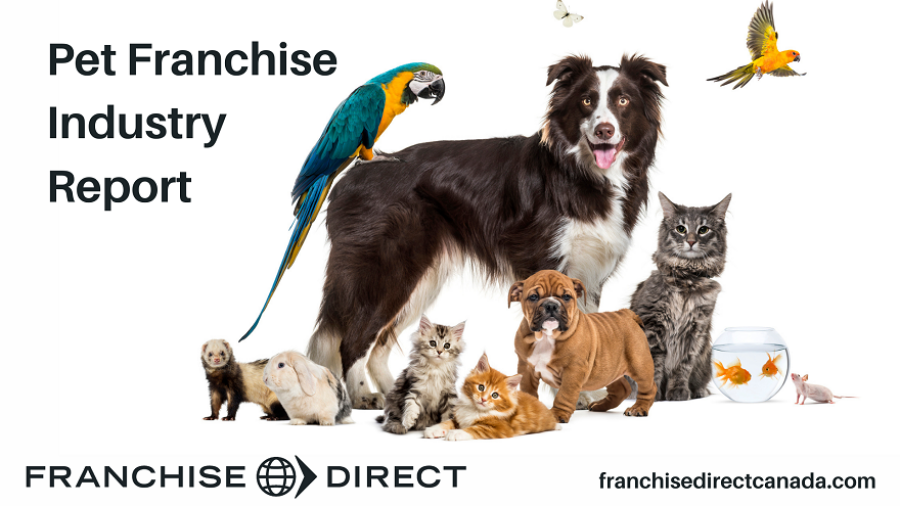🕒Estimated Reading Time: ~8 minutes

Pet ownership has been expanding tremendously in Canada. A survey shows that as many as 73% of households in Canada now have a pet. If accurate, that’s considerably up from the estimated 57% Canadian households that had pets in 2014.
As a result, spending on pets and pet-related products continues to grow. As the pet ownership rate continues to rise, the growth of the pet franchise industry is showing no signs of slowing down any time soon alongside it.
Pet Franchise Industry Categories
Pet industry franchising opportunities can be broken down into the following main categories.
Retail Pet Shops
Perhaps the most traditional pet franchise, it doesn’t matter whether you want to go storefront or online, you can find a pet retail store franchise to fit your budget. Accounting for all pet stores, both franchised and non-franchised, this category brings in an estimated $3 billion yearly.
Dog Training
If you have a love of dogs and you are patient, this might be a good franchising option for you. In addition to training the dogs, you’ll also need to instruct dog owners on best practices to carry on with the training once you are done.
Pet Boarding and Grooming
The pet grooming and boarding industry in Canada includes its namesake services. It’s a category that has seen increased interest as it has an array of mobile or home-based franchise opportunities. According to IBISWorld, the industry at-large has a market size of $837 million annually. It should be noted that sometimes animal shelters, obedience training services, and guard dog training services are combined in this category as well.
Pet Sitting & Dog Walking
Pet sitters look after pets while their owners are away. Dog walking is specific to dogs and requires you to go to a client’s home and taking the dog for a walk to make sure it gets an adequate amount of exercise. Things done by franchisees also might include playing with the pets, making sure they’re fed and giving them medication, if necessary. Services in this category may typically include pet waste removal too. Sometimes you may be asked to perform other duties outside of pet sitting like bringing in the mail and watering plants as well.
Veterinary Services
While these operations obviously require specialized education and training, if you do have the requisite education or you’re interested in pursuing it, there are select veterinary franchises out there.
Other Pet Services
If you can imagine it, there is likely a pet franchise for it. An example of other pet franchises is pet photography studios. Some have even combined photography and grooming so pets can look their best before their photos are taken.
Key Trends in Pet Industry Growth
Pet Parents: More and more people are identifying themselves as pet parents rather than pet owners. Our furry friends are now another member of the family, and this means pet parents buying better food and better toys. Pet parents focus on the physical and mental health of their pets by purchasing orthopedic beds for senior dogs, puzzle toys for puppies, and even spending on pet funeral services.
Premium Products: The pet store industry continues to grow, and franchises can set themselves apart by offering all-natural food products. Consumers are paying greater attention to pet food with natural and organic ingredients, opting for healthy, additive-free foods made with ingredients such as ground flax, Angus beef, fruits and vegetables. Pet owners are also concerned about pet allergies, looking for more specialist products. Pet owners generally spend about $100 per month on pet supplies.
Pet Care: Working pet parents often require care options for their pets, the same as parents would for their child. The need for boarding kennels, pet sitters and walkers has created a growth industry based around pets' well-being and safety. Pet day care is becoming common, with the promise of company, exercise and activities for pets who would otherwise be alone all day. Pet daycares can be run similarly to children's daycares, with playrooms for different pet sizes and ages. Some daycares even offer grooming services and overnight boarding.
Pet Pampering: Even in times of relative economic difficulty, Canadian pet owners are not willing to cut corners when it comes to the family pet, continuing to pamper them endlessly. Pet spas are growing in popularity, as well as eco-friendly grooming services for the green conscious consumer. Continuing the trend of treating pet like people, owners are treating their pets to spa days with the works, including gentle scrubs, warm showers, luxurious grooming, and even dining service. For some, this can mean spending at least $70 per grooming session on their pets, sometimes into the hundreds of dollars.

Factors to Consider When Starting a Pet Franchise
Passion: While opportunities within the pet industry are diverse, and some may not involve much direct contact with animals, it’s still essential to like animals. Owners take their pets extremely seriously, treating them as members of their own family, and you’ll need to be able to respect them as much as you respect your clients and show enthusiasm for working with pets.
Organization: Working with pets is not all fun and games. Passion is great, but you'll also need a sound business sense and be organized. It takes a lot of organization to handle animals, especially if you are operating a doggie day care or a boarding kennel. Launching a new business is a major undertaking, and there is a lot at stake when your business involves a family's beloved pet, but the franchise you choose should offer a helping hand and a system based on organization.
Facilities: It’s important to consider the type of business you want to run, and the facilities needed to run it. Day care facilities or boarding kennels will require more space, while a grooming parlour would involve a lot of supplies. You will need to have a realistic expectation of all the potential expenses necessary beyond the franchise fee. Assess your own financial situation and check out the financing options available to make sure you won’t end up unexpectedly out of pocket. Many franchisors will assist with site selection, but fewer will offer direct financial assistance.
Territory: The franchise may grant you a protected territory with which to operate under their brand and may even assist in finding a location, but you still need to consider your location and investigate other local pet businesses. It wouldn’t make sense to open a pet store in an area which is already well covered by others. Do your research, estimate the local pet population, and try to tap into a needed service by offering something new or unique.
The Brand: How established is the franchise you wish to join? Does it have a good reputation? These are only a few of the questions you should be asking about the brand. If it’s a lesser-known brand, it should at least have a range of franchise benefits and training to make investment worth your while. It’s also a good idea to research the brand’s marketing plan and materials, as substandard marketing will prove detrimental to your business.
Research, Research, Research: Speak to current franchisees of the brand and ask about their experiences. Attend a discovery day, if possible. Visit the franchise's head office and read the franchise agreement thoroughly. In other words, don't get swept away or invest before gaining a comprehensive knowledge of the brand, particularly in terms of its contributions and expectations.
Relevant Requirements/Legislation for Pet Franchisees
It is important to ensure a brand legitimately complies with all necessary animal welfare and manufacturing legislation before signing up.
Pet Store Restrictions: Some communities may have stricter municipal bylaws regarding the sale of animals in pet stores. These bylaws come as an effort to reduce pet overpopulation and to ensure pets being sold were bred and raised under good conditions. Regulations can range from a ban on the sale of unspayed and unneutered pets to banning the sale of pets altogether.
Pet Food: Canadian pet food manufacturers and retailers are subject to several regulations, including the Canadian Food Inspection Agency's animal health safeguards, which make it illegal for specified risk materials to be fed to any animal; the Consumer Packaging and Labelling Act and the Competition Act, which regulate how pet food is labeled and marketed to consumers; and regulations regarding provincial language legislation.
Insurance: Your business will need to be adequately covered from the very beginning. Cover will depend on whether you run the business from home or commercially, and the type of service you are offering. Pet business insurance should cover public liability and liability for the pets you are caring for, along with property damage. Some house insurance policies may also cover home-based businesses. CanadaBusiness.ca is an excellent resource for discovering the necessary requirements and insurance in running a business, whether from home or an external premises. Profur is another resource for specialized insurance for pet care professionals, offering a broad coverage of pet related businesses.
Vehicles: If your role includes the transportation of animals, you will need adequate harnesses and cages, along with insurance which covers special usage. If your pet business is a mobile business, you will need to be sure you get the necessary insurance for your vehicle as well.
Trust: If you are working directly with their animals, you need to ensure that you can build a trusting relationship with clients. The clients need to know that you are capable of caring for their beloved pet. Often, pet spas and daycares are a pet's second home, and pet owners are looking for the right people and the right atmosphere. First aid training and animal behaviour courses will make your client feel at ease and help you in caring for pets to the best of your ability. Lucky for you, virtually all franchise packages provide guidance and training for their franchisees.
Initial Investment and Opening Costs for Pet Franchises
The amount necessary to open a franchise varies depending on the unique business system and execution requirements.
Our franchise profiles will present you with a basic range for the initial investment or minimum cash required to open a franchise. But when it comes to finding out the details of an initial investment, the Franchise Disclosure Document (FDD) is the best place to look. Franchisors offer itemized estimates in their FDD based upon their experience establishing, and in some cases operating, units. However, not all provinces require an FDD. Here is a list of those that do.
Keep in mind these estimates are just that, though—an estimate. Prospective franchisees should review the figures presented with a business advisor, taking into consideration their unique circumstances, before making the decision to enter into a franchise agreement.
Ongoing Costs for Pet Franchises
Don’t forget about the additional costs required for nearly all franchise businesses. This includes expenses such as royalty fees, marketing fees, software fees, training fees, and more.
The most common is the royalty fee. Royalty fees are assessed for the continued use of the franchisor’s trademarks and patented processes, along with certain types of operational support. In addition to regularly assessed fees, other fees are charged on an “as needed” basis such as audit fees, or costs for additional, non-mandatory, training.
It’s important to note that while many initial and ongoing costs are detailed in the FDD, there are some costs inherent to business ownership, like employee wages or utility costs, that aren’t.
--
Pet franchising offers a diverse range of business models in a rewarding industry that has proven as recession-proof as can be. Is pet franchising the ideal route into business for you? Get started by browsing our pet franchise opportunities today.














